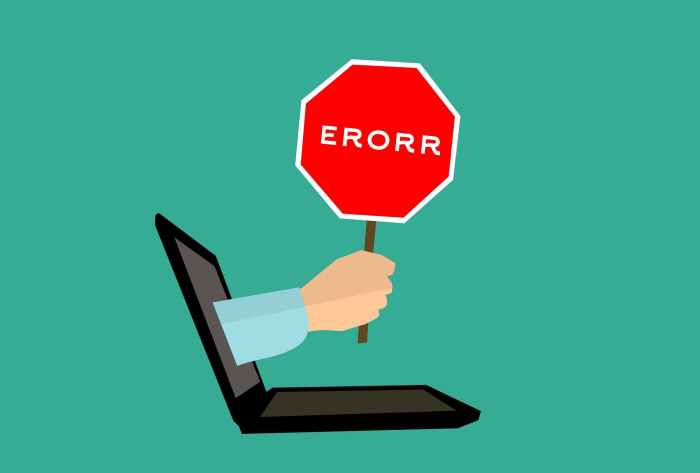
 Data Structure
Data Structure Networking
Networking RDBMS
RDBMS Operating System
Operating System Java
Java MS Excel
MS Excel iOS
iOS HTML
HTML CSS
CSS Android
Android Python
Python C Programming
C Programming C++
C++ C#
C# MongoDB
MongoDB MySQL
MySQL Javascript
Javascript PHP
PHP
- Selected Reading
- UPSC IAS Exams Notes
- Developer's Best Practices
- Questions and Answers
- Effective Resume Writing
- HR Interview Questions
- Computer Glossary
- Who is Who
Common Mistakes in Project Scope Management
When the organization manages projects, there are chances that it may encounter some unwanted errors. The main motive of project management is to reduce risks. Every project head lead must focus on the project alignment aspects. This blog highlights the common mistakes that an organization might face while executing any project.

Common Project Scope Management Mistakes
Check out the listed common mistakes and see if you can initiate better project scope management practices by avoiding these.
Unclear Goals
Unclear goals at the beginning of many initiatives cause them to fail. While stakeholders may have a certain goal in mind, this goal is frequently unclear. Discussing useful key performance indicators (KPIs) or figuring out what a deliverable will look like after the project before work begins are two of the finest methods to nail down a vague aim.
Working Without Training or Prior Experience
Many people, many of whom enter new roles with little to no prior experience, are hands-on learners by default, not by choice. Workplace learning can occasionally be successful. This involves not just the fundamentals of project management only but there are other aspects like thorough comprehension of all the features and capabilities made accessible by the management software they are utilizing.
Those project managers who are experts in managing risks and delivering project requirements are required for more complicated projects. A competent project manager must also have technical knowledge of any technology that is required in the project.
Poor Resource Planning
The chance of success is frequently significantly impacted by the improper utilization of resources. In some enterprises, people get hired based on needs instead of their qualifications and expertise. The whole project is in danger if the team members picked are not well-cast.
This is why it's crucial to work with a capable project head manager who carefully chooses team members who can meet expectations and help the project come to a successful conclusion. Occasionally, having a team of six skilled individuals is preferable to having a group of twelve unskilled individuals.
Not Deploying Project Management Tools
Smart PMs (project managers) are always aware of how to maximize available tools and technologies. Unbelievably, many prosperous businesses are already using at least one or more management solutions to complete tasks more quickly.
Assisting managers in planning, carrying out, and control over every part of the project management process is the major goal of employing management tools for the project. Resource efficiency and tracking will be improved if these tools are used properly, whether the project is basic or complex.
Poor Gathering of Requirements
Many initiatives begin with little more than a headline list of criteria, only to discover later that the demands of the clients were not well grasped. The criteria frequently have gaps, dead ends, or requests that lack coherence without more explanation. Making a declaration of requirements in writing is one approach to get around this issue. As soon as you have drafted your statement of requirements, make sure the client and other interested parties agree to it and recognize the scope of your commitment.
Extremely Confident Deadlines

Project managers may establish excessively optimistic timelines in addition to not accounting for schedule issues. Deadlines that are too tight frequently ignore the amount of work that must be done to fulfill the deadlines. As the deadlines approach, it puts employees under strain, which may result in instances of indifference where everyone appears to be working but no actual progress has been made. To combat this, the project head manager should establish reasonable timeframes that will encourage teammates to work at their highest potential while still allowing for schedule issues or other delays.
Setting up Tasks as Extremely Big Projects
On the other hand, even if you might be hesitant to start too many tasks at once, you must be mindful of excessively large projects. It is occasionally essential to divide a larger project into smaller ones. Every individual on the team may find the entire project to be too overwhelming and unclear when there is only one project that is too huge. Small details might be missed. Additionally, while certain project components can appear inconsequential, failing to meet deadlines or forgetting about them might fail in the overall endeavor.
Omitting to Report Necessary Data

Effective and insightful reporting is frequently a prerequisite for successful project management. Creating project reports might be seen by managers as a routine chore, thus they don't always fill them out completely. Regularly skipping through project reports will eventually come back to haunt project managers in the shape of tasks that have been overlooked or unresolved obstacles that emerge later on.
For instance, stakeholders won't be informed if a work is delayed because a distributor couldn't provide raw materials on time, thus delaying projects that have already encountered difficulties.
Neglecting Team Errors
A project manager may lose their job for making the rookie mistake of ignoring the errors made by the team in charge of the project. Team members might make mistakes since they are human. Allowing errors to spiral out of control, however, might result in a disaster when teammates hide their errors. In the long term, if the issues that were missed spread to other project areas and caused the failure, the project manager should be accountable for that.
Failing to Control Scope Creep
One of the main reasons projects fail is scope creep. Usually, a tiny adjustment request is made first, and then another request is made. Another followed, and so on. It is your responsibility as the PM to ensure that the deliverables are in line with the budget and timeframe.
Starting to involve sponsors in the scope planning process is one strategy to prevent scope creep. Offer your perspective and enquire about their ideas and advice as well. If the project undergoes any fresh adjustments, keep them aware. While executing any project, significantly, one must manage time and put steps to restrict distractions. For that, one can deploy a timer and set priorities for their tasks. The other thing one can do is break down the task into smaller ones.
Conclusion
Usually, in every project, not every mistake happens intentionally. Sometimes due to mismanagement of tasks, errors or mistakes in the project can happen. So for that, it is necessary to have clear communication regarding the processes of the tasks. If all the team associates or members use their time wisely then the chances of mistakes are less. Also for the successful execution of the project, a project manager should be able to recognize the errors committed by particular team members and promptly address them constructively and politely.

